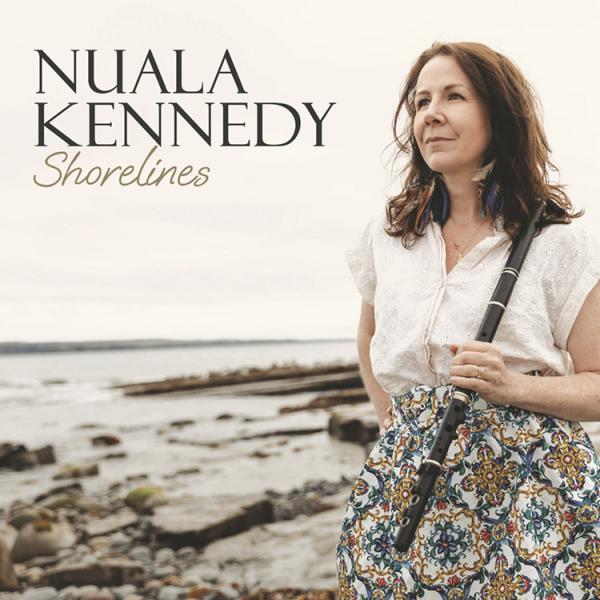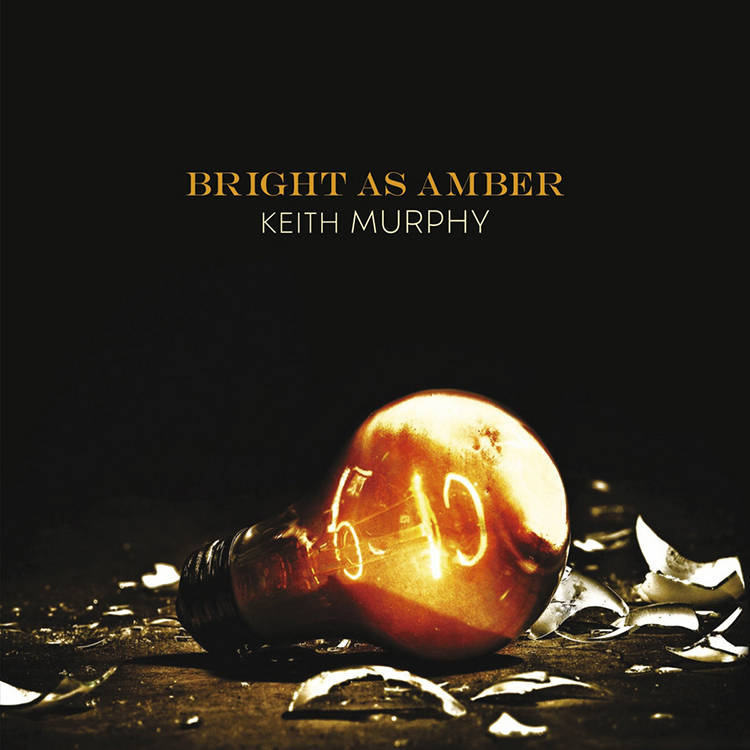October 7, 2023

The phrase “relentlessly creative” seems an apt one for Dundalk native vocalist and flute/whistle player Kennedy, one of the more active and prolific figures in Irish music for the past decade or so. In addition to her solo work – “Shorelines” is her fifth album since 2007 – she’s toured and recorded two albums with John Doyle and Eamon O’Leary as The Alt, formed The Snowflake Trio with Norwegian musicians Vegar Vårdal and Frode Haltli (they released “Sun Dogs” in 2019), put out a single with Lunasa’s Trevor Hutchinson and Kern’s S.J. McArdle as Long Woman’s Grave, and started work on “Hush the Cat,” a collection of music from the Oriel tradition (the old region encompassing southeast Ulster and north Leinster).
“Shorelines” grew out of yet another Kennedy project, commissioned as a concept piece by the Glór Theatre in Ennis and premiered two years ago. At its core, explored through mainly traditional songs along with tunes composed by Kennedy – drawing on inspiration from the coast of Clare, where she and her family now live – is the presence of the sea in the lives of resilient women: how it separates and unites, brings tragedy and opportunity, and inspires both awe and dread. Kennedy is joined at various times by Tara Breen (fiddle), Tony Byrne (guitar), Caoimhin Vallely (piano), Todd Sickafoose (double bass; also co-producer with Kennedy) and vocalists Moira Smiley and Muireann NicAmhlaoibh.
Kennedy enfolds in her winsome, sometimes wistful voice some storied traditional songs on “Shoreline”: the mournful “Sally Sits Weeping” (besides being a feminine name, in Ireland “sally” also refers to a willow tree), with its soaring, melancholy melody, enhanced by Kennedy’s flute and Breen’s fiddle – which, along with Byrne, also lends additional solemnity to “Father Father,” as do Smiley and NicAmhlaoibh’s harmonies. Byrne’s astute accompaniment undergirds “Ye Lovers All,” hands down one of the all-time love-conquers-all Irish songs (Kennedy dedicates it to the late Mick Moloney).
Two rarer gems are “Marguerite,” written by Ontarian Scott Richardson, about 16th-century French aristocrat Marguerite De La Roque’s ordeal as a single mother abandoned off the coast of Quebec (Vallely adds some lovely texture), and “The Cavan Road,” a traditional song she learned from Boys of the Lough co-founder Cathal McConnell that is less about the transatlantic journey than its prelude and conclusion – her a cappella rendition fits the bill.
Kennedy’s talents as a tunesmith, as well as a musician, make for a captivating instrumental counterpart to the songs. A highlight is a Brittany-inspired set that begins with the gavotte-like “Saltwater” – which is punctuated by a nifty quick-ascending riff on the B part – and eases into the reel “Flow,” with some electric guitar flourishes by Byrne to go with his acoustic backing, and then the instruments gradually drop out and Kennedy, Smiley and NicAmhlaoibh sing “Cúcúín,” an Irish Gaelic song about a conversation between a cuckoo and her chicks – cuckoos, Kennedy notes, were thought to be able to travel between worlds, and the three voices (with faint electric guitar and electronica behind them) conjure up just such a journey.
“Wake” is a slow, meditative air, Kennedy and Breen at the high tide of expressiveness while Vallely’s piano gently undulates beneath them. “Sea Reels” (which includes a traditional Scottish reel, “Haul Away Da Hauser”) is an exuberant full-band triptych of mood and shade; along similar lines is a set that begins with the sweet-toned jig “Whirlpool” and segues into “The Lighthouse Polka.”
Throughout the instrumental tracks in particular, Kennedy displays a knack for using her flute as more than a melody instrument, contributing not just harmonies but vivid sustained notes. And throughout the album is Kennedy’s effusiveness and passion for the tradition, and for finding rivulets and channels within it that lead to all manner of possibilities. All told, “Shorelines” is one fine day at the beach. nualakennedy.com

Keith Murphy, “Bright As Amber” • Murphy is well known to audiences in Greater Boston through his masterful guitar playing with Scottish fiddler Hanneke Cassel and the now-retired fiddle ensemble Childsplay, as musical director/performer for the “St. Patrick’s Day Celtic Sojourn," and through appearances with traditional Irish musicians like Liz Carroll and Brian Conway. He has an equally sterling reputation as a singer of mainly traditional songs from the British Isles, Ireland, France, Canada and New England, which he delivers in a clear, resonant and unpretentious voice, striking the right balance between empathy and over-emoting. His most recent album, "Land of Fish and Seals" (2018), featured a supporting cast that would've made for an impressive folk music festival line-up: his wife, fiddler Becky Tracy, Quebecois musicians Yann Falquet and Pascal Gemme, banjo player Mark Roberts, harmony vocalist Rani Arbo, plus Cassel and her husband, cellist Mike Block.
This EP – six songs, including one in French – sees Murphy going in a new direction, accompanied by a trio of Anand Nayak on electric guitar, Reed Sutherland on double bass and J.T. Bates on drums. Their sound is reminiscent of the folk-blues-jazz fusion that emerged in the 1960s and '70s a la Pentangle and early Clannad, with Sutherland and Bates providing a mellow but substantial complement to Murphy’s rhythmically dexterous fingerpicking, which in turn is enriched by Nayak’s crisp, shimmery improvisations and licks.
Most of the songs on "Bright As Amber" will be familiar to anyone with a modicum of interest in traditional music, but Murphy and crew give them some fresh takes. "Mad Tom of Bedlam" – popularized by bands like Steeleye Span and RUNA, among others – has a subtle intensity to it, thanks in particular to the interplay between Murphy and Nayak and Sutherland's harmonies on the verses. "Reynardine," a tale of supernatural seduction, can come across as ominous or romantic, depending on the melody of a particular version; it's the latter case here, and Murphy leans into the enchantment with aplomb (the reverb on Nayak's guitar contributes to the wistful quality of the lyrics).
"Black-Eyed Susan" is interesting enough for its origins alone: Written by "Beggar's Opera" creator John Gay in 1720, the song became popular more in quasi-literary circles than through oral folk tradition. The quartet's arrangement is potent, and the syncopation in Murphy's guitar, amplified by Sutherland and Bates' accompaniment, gives it a rock-n-roll feel that Nayak astutely underscores.
"Oak and Ash and Thorn" – Peter Bellamy's much-beloved setting of Rudyard Kipling's "A Tree Song" – and "Tarry Trousers," a mother-daughter contretemps over her choice of suitor, are stalwarts of the late-20th century English folk scene, and also make for fine listening.
The outlier – a fascinating one – is the final track, "Un Canadien Errant (A Wandering Canadian)," written in 1842 by Antoine Gérin-Lajoie to commemorate the rebels who fought, unsuccessfully, the colonial government of Lower Canada and were executed or forced into exile. It's been recorded by Paul Robeson, Leonard Cohen, and Ian & Sylvia, and appeared in the 1969 film "My Side of the Mountain" and, believe it or not, the "Where in the World Is Carmen Sandiego" video game. Murphy gives the lament a somber but dignified reading that will appeal even to non-Francophones (translations are easily found online).
Announcing the release of "Bright As Amber," Murphy mused that, in an era when people don't listen to albums much anymore, an EP format seemed a very reasonable alternative, where the songs can be regarded as a suite: "I love the way they flow together." It’s quite likely you will, too. keithmurphy.bandcamp.com

